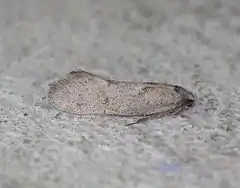Tingena marcida
Tingena marcida is a species of moth in the family Oecophoridae. It is endemic to New Zealand.[1]
| Tingena marcida | |
|---|---|
 | |
| Scientific classification | |
| Kingdom: | |
| Phylum: | |
| Class: | |
| Order: | |
| Family: | |
| Genus: | |
| Species: | T. marcida |
| Binomial name | |
| Tingena marcida | |
| Synonyms[1] | |
| |
Taxonomy
This species was described by Alfred Philpott in 1927 using specimens collected at Bottle Lake in Christchurch by Stewart Lindsay and named Borkhausenia marcida.[2][3] George Hudson discussed this species under that name in his 1928 publication The Moths and Butterflies of New Zealand.[4] In 1988 John S. Dugdale assigned this species to the genus Tingena.[3] The holotype specimen is held at the Canterbury Museum.[3]
Description
Philpott described this species as follows:
♂ ♀ 15–17 mm. Head, palpi and thorax brownish-grey. Antennae brown annulated with grey, ciliations in ♂ 1. Abdomen bronzy, mixed with grey basally, segmental divisions grey. Legs brown mixed with grey. Forewings moderate, costa moderately arched, apex rounded, termen very oblique; white, densely irrorated with pale bronzy-brownish; markings sometimes entirely absent but usually a spot of paler or brighter bronzy brown beneath fold at 1⁄3 and a similar spot in disc at 2⁄3, a spot on costa at 4⁄5 and another on tornus; dorsal spots margined posteriorly with white: fringes concolorous with wing, tips darker. Hindwings pale greyish-fuscous: fringes fuscous-grey with dark basal line.[2]
Philpott pointed out that it is difficult to confirm the identity of this species visually as a result of its lack of markings.[2] However the genitalia of this species is characteristic and gives more reliable evidence of the species identity.[2] Hudson stated that this species was very similar to and might be confused with Tingena innotella.[4] However T. marcida could be distinguished from T. innotella by the terminal appendages of the male of the species.[3] As a result of its greyish colour T. marcida could also be confused with Izatha psychra however T. marcida has antennal pecten which is lacking in the Izatha species.[5]
Distribution
This species is endemic to New Zealand.[1] It has been collected at its type locality of Bottle Lake as well as Governor's Bay and Mount Grey, all in Canterbury.[4] This species has also been found in three sites of ecological significance in Christchurch as set out in the Christchurch District Plan.[6][7][8]
References
| Wikimedia Commons has media related to Tingena marcida. |
- "Tingena marcida (Philpott, 1927)". NZOR.org.nz. Landcare Research New Zealand Ltd. Retrieved 16 October 2016.
- Philpott, Alfred (1927). "N.Z. Lepidoptera: notes and descriptions". Transactions and Proceedings of the New Zealand Institute. 57: 703–709. Retrieved 8 November 2018.
- Dugdale, J. S. (1988). "Lepidoptera-annotated catalogue, and keys to family-group taxa" (PDF). Fauna of New Zealand. 14: 1–264 – via Landcare Research New Zealand Ltd.
- Hudson, G. V. (1928). The Butterflies and Moths of New Zealand. Wellington: Ferguson & Osborn Ltd. p. 269. OCLC 25449322.
- Hoare, Robert J. B. (2010). "Izatha (Insecta: Lepidoptera: Gelechioidea: Oecophoridae)" (PDF). Fauna of New Zealand. 65: 1–201.
- Scott Hooson (9 October 2014). Christchurch District Plan Site of Ecological Significance Cloud Farm (PDF) (Report). Christchurch City Council. p. 13. Retrieved 8 November 2018.
- Scott Hooson (2 September 2014). Christchurch District Plan Site of Ecological Significance Breitmeyers (PDF) (Report). Christchurch City Council. p. 15. Retrieved 8 November 2018.
- Scott Hooson (30 January 2015). Christchurch District Plan Site of Ecological Significance Lathams (PDF) (Report). Christchurch City Council. p. 14. Retrieved 8 November 2018.